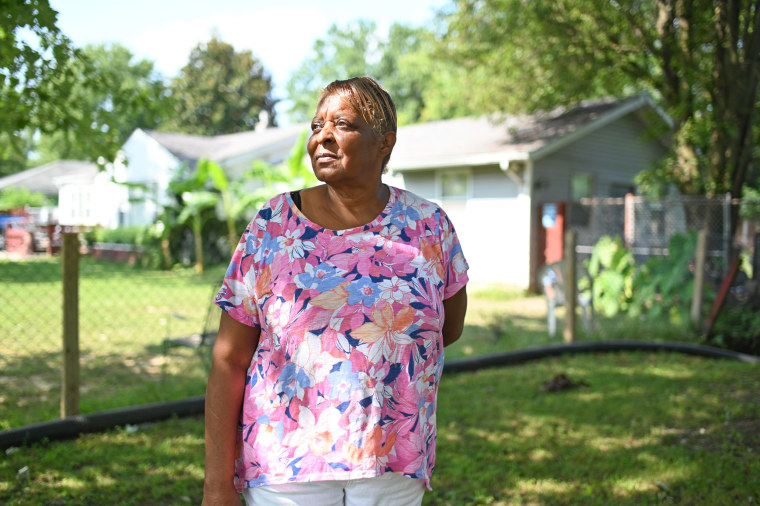Bobby and Sharon Smith haven't flushed their toilet normally in more than a year.
On heavy rainfall days, floodwaters encroach on the modest home they've owned since the 1980s in southwestern Illinois. Even during dry weather, raw sewage can clog the pipes, leaving a foul, lingering stench and requiring perpetual repairs with which the couple, in their 60s, can barely keep up.
"It's horrible," Sharon Smith, a local school district employee who also shares the home with her two children, said recently. "My floors, they buckled up. In my kitchen, the bottom of my sink is rotted out, and it's starting to sink in."
The Smiths' struggle to live free from chronic sewage pollution is common across their section of Cahokia Heights, a small, predominantly Black suburb located across the Mississippi River from St. Louis and formed earlier this year from the merger of three communities strained by population loss and aging infrastructure.
The environmental challenges have spiraled into what the group Centreville Citizens for Change says is a crisis, prompting the federal government to step in twice this month and more than two dozen residents, including the Smiths, to file a federal lawsuit in July alleging that "decades of government failure to ensure basic sewage and stormwater services ... have created an environmental injustice for this Black community."
The "negligence" by the city and local public water district to maintain the sewage and stormwater systems in turn has created a revolting scenario in which "raw sewage pools in yards, bubbles out of manholes, runs down neighborhood roadside ditches, and backs up into tubs, toilets, and sinks," according to the suit. "On one residential street, North 82nd Street, a fountain of raw sewage spews from Defendant Commonfields of Cahokia Public Water District's ... sewage system on a nearly daily basis, even during dry weather conditions."
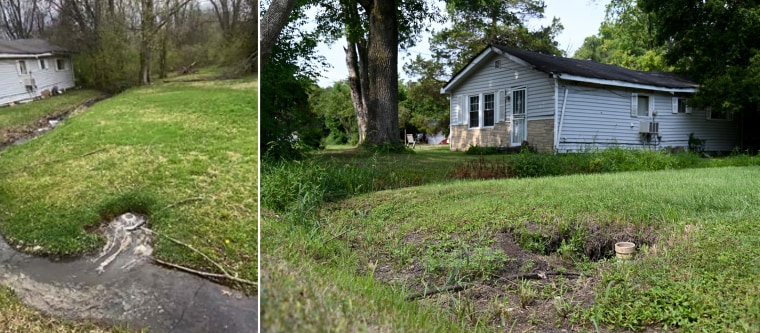
Longtime residents who have been living in the community pre-merger, when it was the independent city of Centreville, say they don't trust the water or drink from the tap. For the past two years, a nonprofit organization, the Urban League of Metropolitan St. Louis, has helped to collect bottled water donations.
"This really is a story about indifference and neglect," said Kalila Jackson, a staff attorney with the Metropolitan St. Louis Equal Housing and Opportunity Council, which is representing residents in their suit along with the nonprofit law organization Equity Legal Services in Belleville, Illinois. Earthjustice, a nonprofit environmental law group, is representing Centreville Citizens for Change in the complaint.
The effort to mobilize in a quest for improved living conditions comes at a pivotal moment of renewed attention on America's infrastructure under the Biden administration and as Washington's elected officials debate how to heap billions of dollars on projects to upgrade roads, public transportation, water and broadband.
For people in Cahokia Heights, desperation has set in. Some liken the lack of a functioning sanitary system to "third-world conditions."
The black mold that formed in the Smiths' bedroom from all the water was so nauseating, they resorted to sleeping on a couch.
"Who can fix the problem?" Sharon Smith asked.
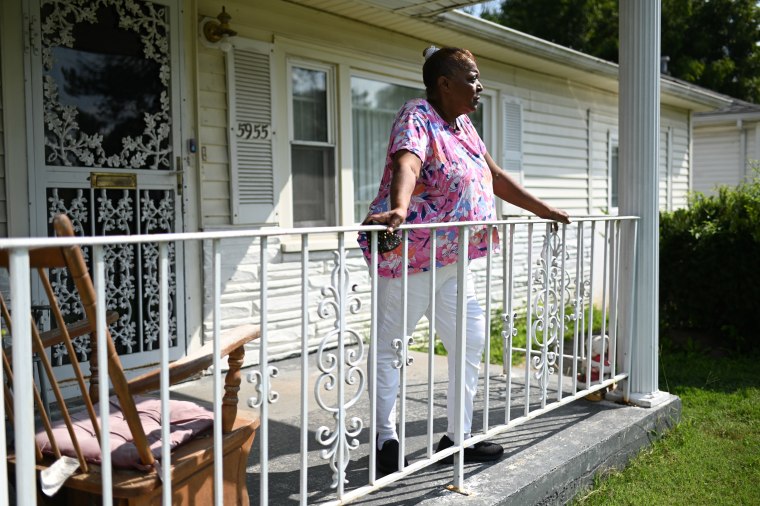
Decades of disinvestment
Centreville, whose population of about 5,000 is 93 percent Black, had been one of the poorest towns in Illinois and the United States, with about half of its residents living below the poverty level, according to census data.
Residents voted last year to form a new municipality by merging with the communities of Alorton and Cahokia, creating Cahokia Heights in May. Officials said they hoped that by consolidating governments, Cahokia Heights can make better use of federal funding for rehabbing infrastructure.
Citizens say that as more white families began moving out beginning in the late 1970s, upkeep of the sanitary sewer system began to wane. Now, parts of Centreville look abandoned, and many residents, some retired and on fixed incomes, simply don't have the financial resources or access to traditional loans to pay for repairs caused by flash flooding and sewage backups.
"They live in one of the wealthiest nations in the world, but these residents exist outside of the social safety net," Jackson said. "No one is coming to rebuild their homes."
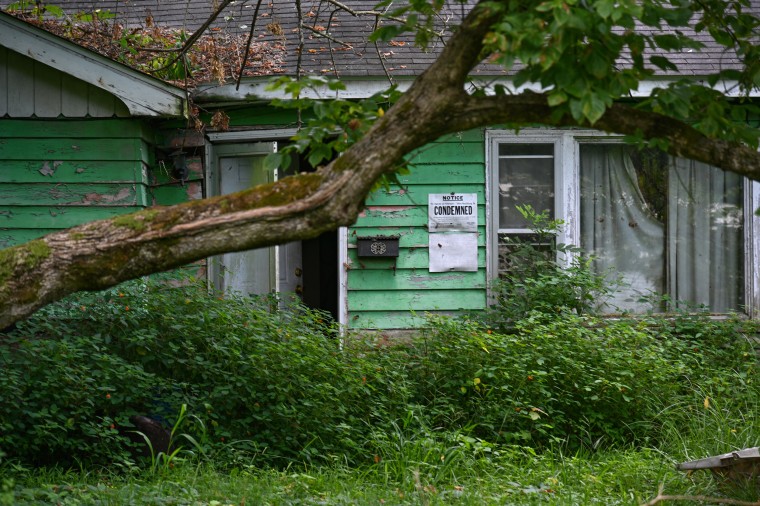
Nicole Nelson, the executive director of Equity Legal Services, became involved in Centreville in March 2018 when a resident named Walter Byrd sought help with an exorbitant utility bill. Offhand, he mentioned to her that whenever he flushed his toilet, human waste would flow out from his yard. Struck by that statement, Nelson followed him to his home and saw the putrid conditions and stagnant waste for herself.
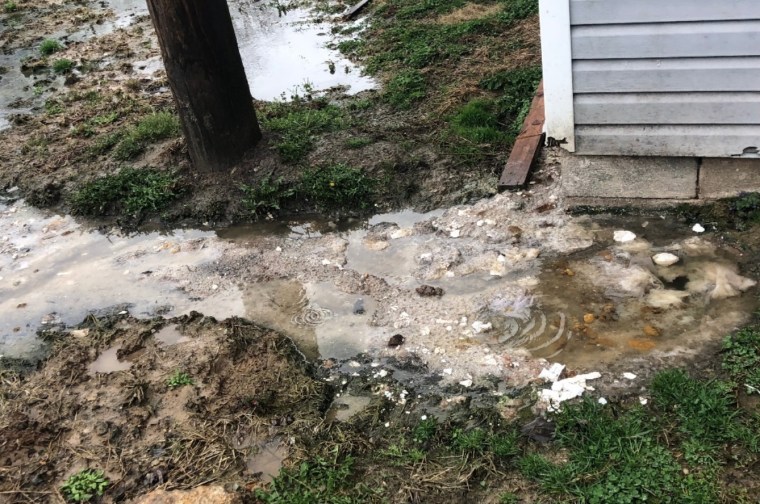
She learned that during the summer, Byrd's family kept all of the windows closed to keep out mosquitoes, which led them to constantly use their air conditioner and run up the electricity bill.
But the problem wasn't relegated to only Byrd's property. Nelson enlisted the help of Jackson, whom she knew from doing work related to racial justice protests in St. Louis, and discovered about 80 families similarly affected.
Jackson said Centreville sits in a low-lying area, where heavy rains cascade down the surrounding bluffs and cause flooding that may not recede for several days. Industrial companies that once operated in the area also contributed to the problem, pumping out groundwater as part of their activities — which, in actuality, artificially lowered the water level and masked the hazardous conditions, the St. Louis Post-Dispatch reported.
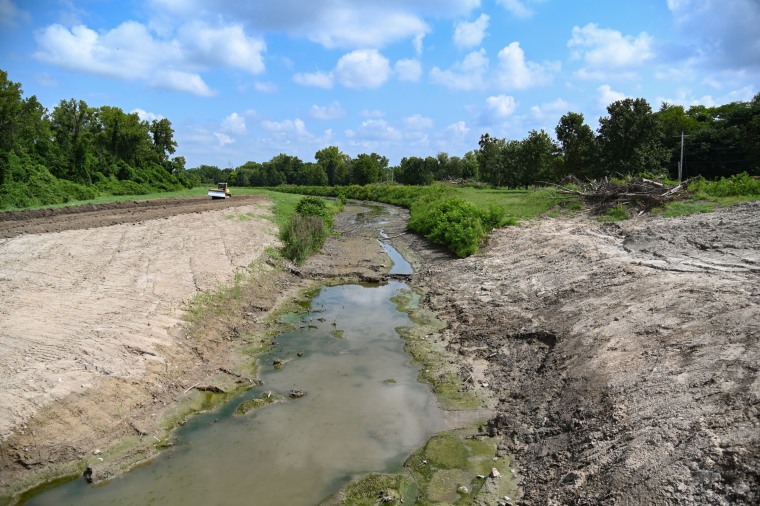
The residents' lawsuit, which was filed in the U.S. District Court for the Southern District of Illinois, contends that the sewage system has long been failing; has "severe inflow and infiltration problems"; suffers from malfunctioning lift stations — pumps designed to move sewage through the system; and leaking manholes that allow sewage to discharge.
The suit also alleges that sewage is allowed to flow into waterways in Centreville, including tributaries to the Mississippi River, which would violate the federal Clean Water Act.
An engineer told residents last month that the work needed to get the system in order would be extensive: Some 70 pump stations need repair or replacement, while 13 miles of repairs are required for existing lines and 8 miles of new sewer must be installed.
Jim Nold, a senior project manager for engineering firm Hurst-Rosche Inc., said at a news conference that hundreds of thousands of dollars were spent annually on temporary fixes, but millions of dollars are needed for a true overhaul.
The local government "put Band-Aids on this system to make spot repairs, but it isn't enough to keep up with the damage that occurs," he added.
Starting again
The city and the Commonfields of Cahokia Public Water District have asked the courts for an extension to respond to the allegations in the residents' complaint. Cahokia Heights voters agreed in April to dissolve Commonfields, and officials are working on how to replace the agency.
Neither Cahokia Heights Mayor Curtis McCall Sr., who was previously the township supervisor of Centreville, nor water and sewer department officials returned requests for comment.
The suit seeks damages on behalf of residents to be determined at trial and for Commonfields to take action to "prevent or minimize threats to public health and the environment."
McCall, at the news conference last month, pledged to spend about $2.8 million in federal coronavirus relief aid toward fixing the sewer system, which is permissible under President Joe Biden's 2021 American Rescue Plan Act. The city was denied a Federal Emergency Management Agency grant.
"If we can't qualify for a grant, then who in the hell can?" McCall asked.
After residents' plight reached the attention of some of the state's top elected officials — including Democratic Gov. J.B. Pritzker, who called the situation a "textbook example of environmental racism" — the U.S. Environmental Protection Agency issued two orders this month for action. One requires Cahokia Heights to ensure constant monitoring of drinking water pressure and testing for bacteria (the agency noted there has been no evidence of drinking water contamination), and separately, the city must submit plans to identify and address sanitary sewer overflows.
"This order will assist the city in focusing on identifying the most urgent needs for repair of the sewer system in order to protect the public's health," Cheryl Newton, the acting administrator for the EPA region that includes Illinois, said in a statement.
Debbie Chizewer, the managing attorney for Earthjustice's Midwest office in Chicago, said local officials' inaction over the decades only allowed the problem to fester, and residents have had to fight for the city to do even routine maintenance and inspections.
"They literally have to start from the beginning," Chizewer said of the requirements placed on the city.
Earlie Fuse, who purchased his Centreville home in 1992, said he remains wary because some of the same people who had the opportunity to take action in past years are still in charge.
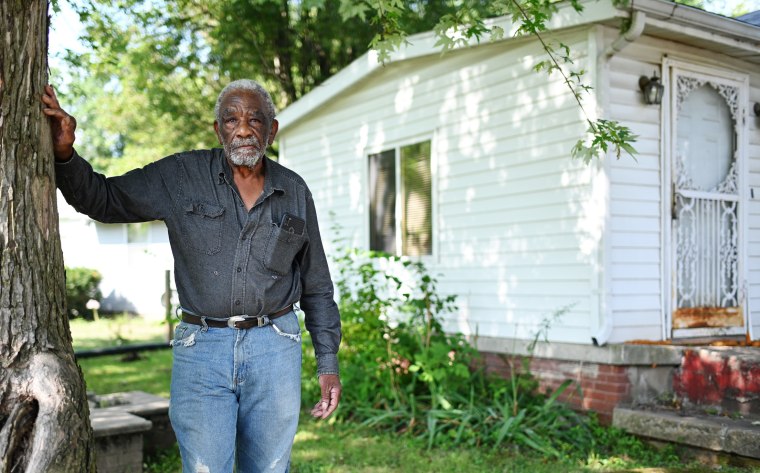
His basement walls have collapsed four times after dark brown floodwaters poured in over the decades, and he's relied on plywood as a solution. Much like what the city has been doing, it's a temporary fix.
Residents "should never have had to been the ones to clean all this up themselves," Fuse, 80, said. "It should have been cleaned up from the beginning."
Jackson agrees.
"Communities of color often have to be creative and resilient and strong," she added. "These people here, they've managed to survive in conditions that would simply be unfathomable and unacceptable to most."
